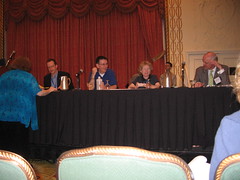 Moderated by Andrew Pace, this session was in the format of a Q&A/debate among the panelists: Stephen Abram, Joseph Janes, and Karen Schneider.
Moderated by Andrew Pace, this session was in the format of a Q&A/debate among the panelists: Stephen Abram, Joseph Janes, and Karen Schneider.
Lots of fascinating things here – I don’t think I got it all down on paper, but I left with a lot of new thoughts on my mind. One major point that all three agreed on is that the profession should not be so afraid to take risks. If something fails, so what? We tried. Learn from it and apply that knowledge to something else. And innovation does not necessarily have to be on vast scales – something small can be just as important and ultimately build to something larger.
The central question was the titular ‘Do Libraries Innovate?’
While each panelist phrased it a bit differently, all seemed to agree that while individuals in libraries are innovating, the institutional support is very often lacking. New ideas are squelched with negative criticism even before they have a chance to succeed or fail on their own. A prime example of this was Maricopa County Library’s experiment with ditching Dewey in one branch. Even before their doors opened, the criticism had reached thunderstorm levels. But, the patrons seem to love it.
So what are the marks of an innovative library?
Abram: Having a tough hide is necessary, the process should be shared so others can learn from it, and don’t be afraid to be a follower of a new idea.
Janes: Don’t be afraid to fail. Example of why not: Even when Apple’s Lisa computer failed, that ultimately led to the Macintosh. Development is more important than Research (in tech areas at least) – get out there and experiment.
Schneider: Be willing to re-evaluate the definition of success. Example: Flickr started as some sort of gaming site, then shifted to photography when it became apparent that users wanted that aspect of their functionality above all others.
Discussion also repeatedly came back to the “culture of victimization” that permeates the profession. Why do we focus so much on the disasters, instead of celebrating successes? Yes, a few libraries had to close due to budget cuts recently. But meanwhile, overall funding increased nationwide. The closings are what we give headlines to. Janes mentioned that maybe we ultimately feel dispensable and don’t give ourselves enough credit.
I didn’t note who said this, but the quote “Change happens from those who show up” stuck with me. Innovation is impossible without someone willing to try. Libraries won’t innovate themselves.
How can we compete with the private sector for both hiring and for the users’ attention?
Janes: We should get over the idea of requiring an MLS to be useful in a library. Experts of all backgrounds have a role to play.
Schneider: For that matter, why do we make systems librarians do shifts on the reference desk? Shouldn’t their time be spent where they are most useful?
What about the role associations like ALA play in innovation? Abram noted that ALA often serves as a sandbox – new things are experimented with there, then rolled back into individual libraries. But on the downside, recent discussion on the Ning Library 2.0 site beats any of ALA’s 2.0 efforts. Janes says we have to revitalize ALA from within, not start over from scratch. We need the advantages of scale that organizations like ALA and OCLC have. No libraries have that same critical mass to initiate a profession-wide change.
Another point that came up often is just how long it takes for new ideas, after being proven successful, to spread to other institutions. The diffusion rate is painfully slow, so even when a great innovation comes along it is often not adopted by all.
What are the panelists’ visions for library innovation?
(I didn’t note who said what here)
-Share our experiences
-Learn to brag
-Cultivate a culture of acceptance for risk and failure, be more merit-driven
-Find what the end users want, then do it
-Learn to think broadly, don’t get paralyzed by really far out concepts
-Work to change where libraries fall in national priorities
-Set up reciprocal mentoring among generations to draw on each’s strengths
These are only a few of the major points from the discussion. There was no way I could write fast enough to keep up with them all 🙂